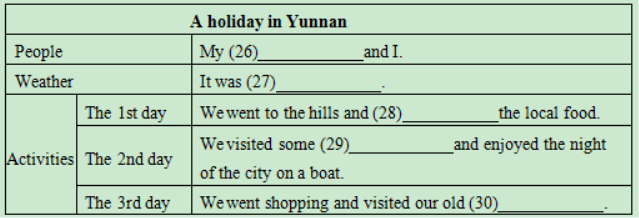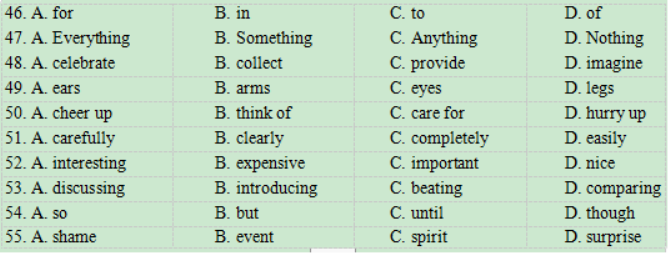英 语
(考试时间 120 分钟 赋分 120 分) 考生注意:1. 请务必把第Ⅰ、Ⅱ卷各题的答案填涂或写在答题卡上;
2. 选择题部分必须使用 2B 铅笔填涂;非选择题部分必须使用黑(蓝黑)墨水笔书写, 字体工整、笔迹清楚。
第Ⅰ卷(共 85 分)
一、听力理解(每小题1 分,共 30 分)
(一) 听句子,选择与句子内容相符的图片。每个句子读一遍。

(二)听句子,选择正确的答语。每个句子读一遍。
5. A. History. B. Blue. C. Oranges.
6. A. Her uncle. B. In Shanghai. C. A watch.
7. A. She is a nice girl. B. What a pity! C. I’m sorry to hear that.
8. A. Yes, I have. B. Yes, I did. C. No, I don’t.
9. A. Never mind. B. Thanks. C. Sure, here you are.
10. A. I think so. B. It’s interesting. C. In the cinema.
(三) 听对话,选择正确的答案。
A) 你将听到五段对话及五个问题,选择正确的答案。每段对话及问题读两遍。
11. A. Noodles. B. Bread. C. Cakes.
12. A. Math. B. Chinese. C. English.
13. A. Jim. B. Jim’s father. C. Jim’s mother.
14. A. 40 dollars. B. 50 dollars. C. 100 dollars.
15. A. Once a year. B. Twice a year. C. Once a month.
B) 你将听到两段对话,请根据对话内容,选择正确的答案。每段对话读两遍。 听第一段对话,回答第 16 至 17 小题。
16. When is the man’s cousin’s birthday?
A. On October 24th. B. On November 25th. C. On October 25th.
17. What will the man buy for his cousin?
A. A card. B. A bag. C. A hat.
听第二段对话,回答第18至20小题。
18. Where has Peter gone?
A. To the beach. B. To the park. C. To the library.
19. What does Jane want to return to Peter?
A. His dictionary. B. His backpack. C. His bike.
20. When will Jane join Mike to collect the rubbish?
A. Next month. B. Next Saturday. C. Next Sunday.
(四) 听短文,选择正确的答案。短文读两遍。
21. How old is Tony?
A. Thirteen. B. Fourteen. C. Fifteen.
22. Where is Tony now?
A. In Paris. B. In Beijing. C. In New York.
23. How long has Tony studied there?
A. For three weeks. B. For three months. C. For three years.
24. Why is Tony’s family going to the town?
A. To see his grandparents. B. To have a big dinner. C. To see his uncles and aunts.
25. What will Tony do for his family?
A. Sing. B. Play the drums. C. Play a piece of piano music.
(五) 听短文,请根据所听到的内容,完成下面表格(每空一词)。短文读两遍。

二、单项选择(每小题 1 分,共 15 分)
从每小题所给的四个选项中选出最佳选项。
31. —Look, there is a cute bird, dad.
—It flew into our living room the window just now.
A. across B. through C. above D. under
32. —Hello, this is Jane. Can I speak to Mr. Li?
—Sorry, he isn’t at home. Should I take a(n) for him?
A. news B. information C. decision D. message
33. —Please give Kate the storybook you see her.
—All right.
A. or B. so C. if D. because
34. —Who has an English dictionary?
—I have . Here you are.
A. it B. any C. that D. one
35. —Hainan is a good place to take a holiday. Why not going there for your holiday?
—Good idea.
A. consider B. mind C. risk D. forget
36. —Why does Liu Ming dislike traveling by plane?
—Because he always feels when getting on it.
A. interested B. relaxed C. happy D. nervous
37. —The manned spacecraft Shenzhou -13 carrying 3 astronauts returned to the earth on April 16.
—I’m proud of our motherland.
A. successfully B. luckily C. suddenly D. happily
38. —What do you think is the best way English?
—We should use it every day.
A. learn B. learns C. to learn D. learning
39. —One can’t find true friends if he only himself.
—Yes, you’re right.
A. laughs at B. cares about C. talks about D. shouts at
40. —Excuse me, where can I my suitcase (手提箱)?
—Oh, you can get it right there.
A. make up B. put up C. pick up D. set up
41. —Mum, when will we go to the zoo?
—As soon as the rain .
A. is stopping B. will stop C. stop D. stops
42. —Do you accept to have the classes online, Tina?
—Yes. Nowadays online education is than old education forms.
A. smart B. smarter C. smartest D. the smartest
43. —How does your father help you in your life?
—When things aren’t going well, I not to give up by him.
A. encourage B. encouraged C. am encouraged D. will encourage
44. —Judy, you look beautiful in the dress. Could you tell me ?
—OK. I bought it in a store online.
A. where you bought it B. where did you buy it
C. when you bought it D. when did you buy it
45. —Don’t worry. You’ll do better next time.
—
A. Congratulations! B. That’s very kind of you.
C. Well done! D. I’m sorry to hear that.
三、完形填空(每小题1 分,共10 分)
阅读下面短文,从各题所给的选项中选出最佳答案。
Mrs. Black has had a special scarf for many years. One day she decided to give it 46 her granddaughter, Ann, to wear to her first job interview (面试) for good luck. Mrs. Black was afraid Ann would lose the scarf,but the granddaughter promised, “Don’t worry, Grandma. 47 will happen to your scarf. It can bring both of us good luck today.”
That afternoon, after Ann finished the interview, she felt sure that she could get the job. So she decided to 48 by going to a restaurant. As she was sitting at a table, she felt someone looking at her. Sitting next to her was an old woman, who could not take her 49 away from her.
“Excuse me, do I know you?” Ann asked. “I’m sorry, dear, but you make me 50 my best friend,” the old woman replied. “She looked like you and used to wear a scarf just like the one you’re wearing around your neck. “Ann listened 51 , with her eyes and mouth wide open. She heard about some stories of her grandmother’s best friend and knew how 52 the scarf was. Could she be Monica, her grandmother’s childhood friend?
Then she heard the woman 53 herself. “My name is Monica,” she said. “I used to live in
Canada as a child, 54 my family had to leave when I was 14. I’ve lived in America ever since.” What a(n) 55 ! Ann could not believe her ears.

四、阅读理解(一)(每小题2 分,共30 分)
阅读下列短文,从每题所给的选项中选出最佳答案。
A
These years, a few big changes in city life in China have drawn the world’s attention. Among them, four stand out ( 突 出 ). They are known as “China’s four great modern inventions” among the Internet users.
Online shopping
China has many big online shopping platforms (平台), such as Taobao, Tmall (天猫) and JD. (京东) com. They have made online shopping a lifestyle choice for many people in China. Some foreign customers have even made foreign-language websites to help foreigners buy goods (产品) from China.
High-speed trains
On Sept. 21, China’s new high-speed train Fuxing made its first run from Beijing to Shanghai. It ran at a speed of 350 km/h. This makes it the fastest train in the world. In fact, the high-speed train is now China’s new name card overseas (在海外).
Cashless payment (无现金支付)
In China, now you could just pay with your telephone to buy things. All you need to do is to scan (扫描) a store’s QR code (二维码). Even a vegetable seller on the roadside has a QR code for WeChat Pay or Alipay (微信支付或者支付宝).
Bike-sharing
In China, there are about 10 million shared bikes. Users unlock (解锁) bikes using mobile apps (移
动应用程序). They don’t need to find stations to leave the bikes. This makes bike-sharing much easier.
56. Which of the following is NOT known as one of “China’s four great modern inventions”?
A. High-speed trains. B. Cashless payment. C. Online shopping. D. Car sharing.
57. What’s the speed of the fastest train in the world?
A. 280 km/h. B. 350 km/h. C. More than 350 km/h. D. Not mentioned.
58. What should you do if you pay with your telephone to buy some vegetables in China?
A. Give your telephone to the seller. B. Give the seller some money.
C. Give the seller things instead of money. D. Scan the seller’s QR code.
59. Which of the following is TRUE?
A. China is now famous for the high-speed train overseas.
B. Only big stores or shopping malls can support cashless payment.
C. Foreigners can’t buy goods from China on the shopping platforms.
D. Users of shared bikes should put the bikes at the bike station after using it.
60. What’s the passage mainly about?
A. How to go shopping online. B. Bike-sharing makes the life easier.
C. China’s four great modern inventions. D. China is famous for the high-speed train.
B
When an Italian man went to work with a mask (口罩) to protect himself from the COVID-19, he was criticized (批评) by his workmates for causing panic (恐慌). But in China and other Asian countries, almost everyone wears a mask during outbreaks (爆发). Why do the East and the West have different ideas about wearing masks?
In the West, people wear masks only when they get sick. People see masks as a tool to protect sick people and stop disease (疾病) from spreading, so healthy people don’t need to wear them. If a person goes out with a mask, other people may look at him like a virus ( 病 毒 ) spreader. Even their friends tried to stay away from them. Some Western people say wearing a mask in public makes them feel “worried”, “shy”, and “afraid of being looked at differently”. But as the number of COVID-19 cases ( 病 例 ) keeps growing around the world, more and more healthy people are starting to wear masks to protect themselves, people in the West are changing their ideas.
In Asian countries like China and Japan, wearing masks is common. In 1910, Chinese doctor Wu Liande invented the modern medical mask. During the 2003 SARS,people used masks widely in China and East Asia. Many Chinese also wear masks to keep warm in winter or protect against air pollution. In Japan, some young women may wear masks when they don’t have their makeup ( 化 妆 ) on. Many pop stars in Asia also wear masks to protect their privacy ( 隐 私 ) when they go out. This cultural background has made it easier for people in the East to wear masks during the COVID-19 outbreak.
61. How did the Italian man’s workmates feel about him?
A. He caused panic. B. He was too worried to work.
C. He didn’t want to go to work. D. He wanted to protect himself.
62. Why do Western people refuse to wear masks?
A. Because they are afraid to look ugly with face masks.
B. Because they don’t want others to know they are ill.
C. Because they hope to comfort other people in this way.
D. Because they don’t think healthy people need masks.
63. Where was the modern medical mask invented?
A. In England. B. In China. C. In Japan. D. In the USA.
64. Which of the following is Not TRUE according to the passage?
A. Asian people wear masks to protect their privacy.
B. Asian people wear masks to protect against air pollution.
C. Asian people wear masks to stop disease from spreading.
D. Asian people wear masks to make them look fashionable (时尚的).
65. What does the passage mainly talk about? .
A. Western people’s trouble of wearing masks.
B. The reasons why masks are popular in Asian culture.
C. Different ideas of using masks in Eastern and Western countries.
D. The importance of wearing masks during the COVID-19 outbreak.
C
How do animals recognize (识别) human’s faces? This question is at the heart of Chinese American scientist Doris Tsao’s research. Tsao was known as one of the winners of 2018 MacArthur Award (麦克阿瑟奖)-one of the highest academic (学术的) honors in the US. Each year, the MacArthur Foundation chooses twenty to thirty talented people and gives money for their work.
Tsao’s team does some experiments (实验) with monkeys. The scientists found out that there are about 200 nerve cells (神经细胞) in the monkeys’ brains. They can help the monkeys to recognize faces. Each cell can recognize a different facial (面部的) characteristic,such as the shape of our face or the color of our skin. With all of the information, monkeys can build a picture of a person’s face in their minds.
Through their study, the scientists showed us how monkeys “see” human faces in their own minds. They showed the monkeys pictures of some different human faces. At the same time, they recorded the activity of every nerve cell in the monkeys’ brains. Then, they were able to use computer to study this brain activity and finally find out the faces that the monkeys “saw” in their minds.
Although the study was about monkeys, scientists believe that human beings might recognize faces in a similar way. Police could use this technology in the future. They could recreate ( 重 现 ) the face of a bad guy by recording a witness’ (目击证人) brain activity, Tsao told the Daily Mail.
66. What can help the monkeys recognize a person’s face?
A. Eyes. B. Nerve cells. C. Skin color. D. Experiments.
67. How did the scientists find out the faces in the monkeys’ minds?
A. By putting computers into the monkeys’ brains.
B. By asking an artist to draw pictures of the faces.
C. By showing the pictures of human faces to the monkeys.
D. By recording the brain activity and studying it with computer.
68. Which of the following is TRUE according to the passage?
A. The MacArthur Foundation chooses hard-working people.
B. Scientists think humans recognize faces in a different way.
C. There are more than 200 cell nerves in a monkey’s brain.
D. Tsao believes this technology could be used to find bad guys.
69. What does the underlined word “characteristic” mean in Chinese?
A. 表情 B. 性格 C. 特征 D. 动作
70. What is the best title of the passage?
A. How Monkeys See Us B. Where We Can Find a Bad Guy
C. What Human Faces Are Like D. Why the Experiments with Monkeys Are Successful
第Ⅱ卷 (共 35 分)
五、单词拼写(每小题 1 分,共 10 分)
根据句子中所给的单词首字母或中文提示,填写正确的单词。
71. We all know that Thursday comes after W .
72. It was d outside and I couldn’t see anything.
73. My birthday is in September- the n month of the year.
74. You shouldn’t swim a in the river. It’s very dangerous.
75. Ninety p of the students in our class go to school by bus.
76. Enjoying the (美丽) of nature will make you feel relaxed.
77. They decided to (取消) the activity because of its hidden danger.
78. We promise to make less rubbish and never (污染) the environment.
79. Teenagers are supposed to help with housework to (发展) their independence.
80. Everyone else in my class was invited (除……之外) me, and I don’t know why.
六、选词填空(每小题 1 分,共 5 分)
根据短文内容,用方框所给单词的适当形式填空,使短文通顺、完整,每词限用一次。
![]()
Pablo Picasso(毕加索)was born in Spain(西班牙)in 1881. His father was an artist and also an art teacher. He gave little Picasso the first lesson in drawing. The boy showed great interest in it and learned it very quickly. Picasso drew so (81) that he won a prize “Science and Charity" for his first important painting at the age of 15. Later he studied in several (82) in Spain. But no one could teach (83) because he had known so much.
When he was 23, he moved to Paris to live and (84) the rest of his life in France.
At that time, Paris was the center of the world for artists.
In his 80s, Pablo Picasso kept on looking for new ideas and new ways to work. He never stopped (85) all his life. Pablo Picasso, one of the greatest artists in the world, died in 1973. 七、阅读理解(二)(每小题 2 分,共 10 分)
阅读下面短文,根据短文内容回答问题。
Dreams are like stars. You may never catch them, but if you follow them, they will lead you to success. Yan Ning is such a dream follower.
Yan is a rising star in the science world. When Yan Ning was only a little girl, she dreamed of being a scientist. After years of hard work, in 1996, she went to Tsinghua University to study biology. After graduating from Tsinghua in 2000, she went to Princeton University and finished her study there in 2007. Then she returned to Tsinghua and set up her own lab (实验室). At the age of 30, she became
the youngest professor (教授) at Tsinghua.
Now Yan has become a leading researcher at Princeton. She is one of the 100 new members in the US National Academy of Science (美国国家科学院).
However, it was a long and difficult road for her to make such achievements. She said that in order to make her dream come true, she experienced a lot of difficulties. But she never gave up her dream. Instead, she followed her dream and fought for it. She usually works for at least 14 hours a day. Sometimes she even forgets to eat and rest, and she always works until late night. She never gets tired because she thinks doing research is the most “comfortable” job for her.
In a TV interview, Yan asked young people to work hard for their dreams. “All our dreams can come true if we have the courage to follow them.”
86. Which subject did Yan Ning study at Tsinghua University in 1996?
![]()
87. When did Yan Ning finish her study at Princeton University?
![]()
88. Did Yan Ning become the youngest professor at Tsinghua when he was 25?
![]()
89. How long does Yan Ning usually work every day?
![]()
90. What does the passage mainly talk about?
![]()
八、书面表达(共 10 分)
在2022 年北京冬奥会上为中国夺得两金一银的Eileen Gu (谷爱凌) 通过自身努力, 即将以优异的成绩进入斯坦福大学学习。她的自信, 自律和敢与挑战自我的精神为她圈粉无数。作为她的粉丝及一名九年级的学生杨东, 你想写信告诉她, 你深受她的激励, 会竭尽全力为 6 月份的中考做准备。
提示: 1. 为她感到开心和骄傲;
2. 认识到时间的重要性, 制定相应的学习计划, 严格要求自己;
3. 远离手机、电脑等电子产品;
4. ……(至少补充 2 点)。
要求: 1. 内容必须包括所给的要点, 可适当发挥,但不要逐字翻译;
2. 条理清楚、语句连贯;
3. 词数: 80 个左右(开头和结尾已给出, 但不计入总词数);
4. 文中不得出现真实的地名、校名和人名。
Dear Eileen,
I heard that you will enter Stanford University with good grades.
![]()
![]()
![]()
Yours, Yang Dong

2023银川市第三中学中考英语模拟试题及答案

2023杭州市采荷中学中考英语模拟试题

2023无锡市东林中学中考英语模拟试题

2023海口市第十中学中考英语模拟试题

2023苏州立达中学校中考英语模拟试题

南京市金陵江文学校中考英语模拟试题及答案

2023南京师范大学附属中学新城初级中学中考英语模拟试题

2023青岛市实验初级中学中考英语模拟试题